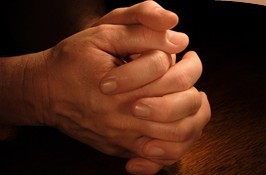
Website location: Home > Developing Spirituality > Spiritual Teachings > Forgiveness > Forgiveness - A Vital Aspect
|
FORGIVENESS: A VITAL DIMENSION
When it comes to forgiveness, I have had to wrestle with the subject, and I have found myself up against a wall of mystery. Frankly, I do not understand about forgiveness. I only know that it is something very holy and very healing and it is quite simply a gift of God.
My thesis, then, is that forgiveness comes as a gift which we receive freely not by right. We in turn give it by God’s great grace, not by our own power. Sometimes it is easy to forgive, sometimes impossible. We cannot forgive at will, nor can we demand of others that they forgive those who have wronged them. We can only humbly ask for forgiveness for ourselves or for the power to forgive others, and wait in hope and trust that it will be given. This, then, is my understanding of forgiveness.
For many of us, we can achieve an intellectual approach to forgiveness. For example, if I can forgive my mother for rejecting me because I now understand that she did not mean to hurt me, I can also forgive myself when I too am unwittingly hurtful. I realise we are all locked into patterns of life and behaviour in which we inevitably hurt and are hurt. When I understand how things come about, I find I have no logical course but to forgive. Accordingly, I can also, at an intellectual level, forgive the cruel dictator, the rapist, and the child abuser.
A further example is the painful experience of rejection. In essence, it is an example of something we all experience at some time in our lives: betrayal by someone we have trusted. The man or woman whose partner has been unfaithful feels the same kind of outrage and pain when they find that their trust has been betrayed.
With this pain comes a deep anger which if I understand it right has its roots in fear. The ground we thought was firm under our feet gives way and as we crash through the branches into the pit we cry out in terror and then in rage. Anger is a very primitive emotion with which we seek to defend ourselves against a world that we perceive as threatening our security, our very survival. I suspect that it is impossible to forgive until we have regained our former security or, more likely, found a new place of safety. The experience of psychotherapy has taught me much about rejection, anger, and forgiveness. Part of the process of return to wholeness is the acknowledgement, not only that we have been deeply hurt, but that we are very angry. It is only when we have faced our anger that we are able to explore just how it was that we came to be betrayed. This understanding of the roots of human behaviour is the key to the intellectual approach to forgiveness.
At a gut level, however, I may have no power to forgive, and this is something we all experience. We may well have learned what it is like to have hatred in one’s heart and to want another person dead. We may have also learned what it is like to be powerless to forgive. That is why I would never say to someone: “You must forgive.” I would not dare. Who am I to tell a woman whose father abused her or a mother whose daughter has been raped that she must forgive?
I can only say: however much we have been wronged, however justified our hatred, if we cherish it, it will poison us. Our heart will become bitter and our vision clouded and our love will wither away. Hatred is a devil to be cast out and we must pray for the power to forgive, for it is in forgiving our enemies that we are healed.
Source: Notes excerpted and based on – Cassidy, Sheila. “Seventy Times Seven”. The Tablet (March 2, 1991): 267-8.
[Photo credit: Intellimon Ltd.]
|
Website location: Home > Developing Spirituality > Spiritual Teachings > Forgiveness > Forgiveness - A Vital Aspect
|
|
OTHER LINKS Not from author |
Web design: Alexander Peck (using XSitePro2 site builder)
Photos: Alexander Peck (unless otherwise noted)
© 2010 and beyond - All Rights Reserved
Website hosting: VodaHost (unlimited websites at low cost)
Last updated: December 5, 2010


